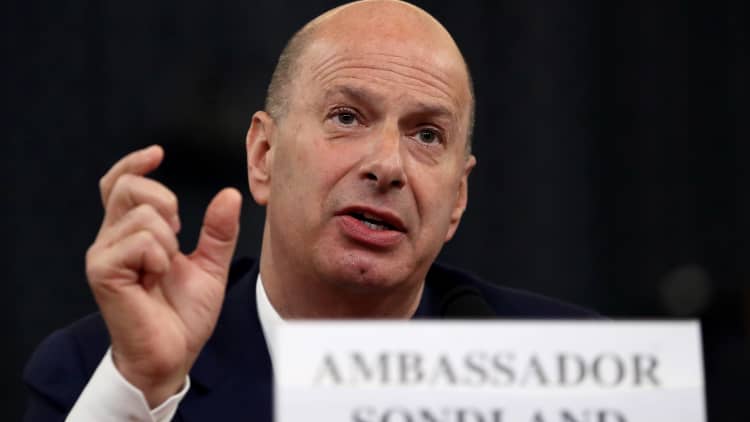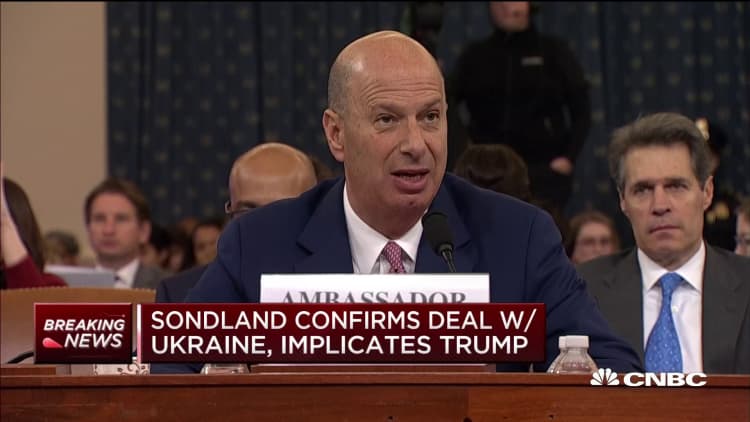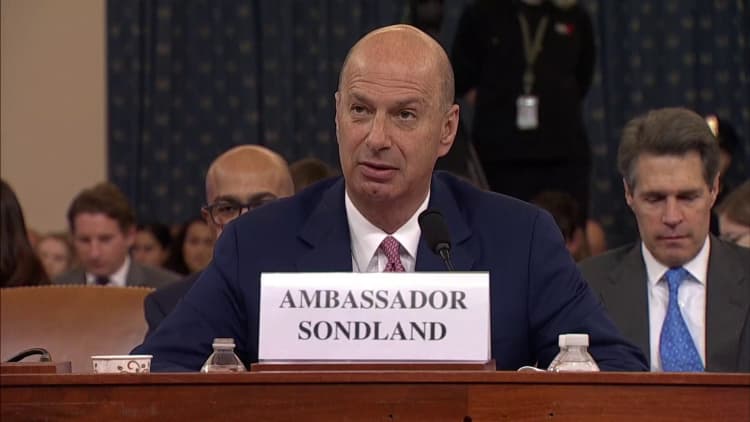
In stunning testimony, U.S. Ambassador Gordon Sondland told House impeachment investigators Wednesday that President Donald Trump directed Rudy Giuliani to pursue a "quid pro quo."
The requests by Giuliani, Trump's personal attorney, involved granting a White House meeting for Ukraine's newly elected president, Volodymyr Zelenskiy, Sondland testified.
"Mr. Giuliani demanded that Ukraine make a public statement announcing investigations" into the 2016 U.S. presidential election and Ukrainian natural gas company Burisma Holdings, where former Vice President Joe Biden's son Hunter had been a board member, Sondland said.
"Mr. Giuliani was expressing the desires of the president of the United States, and we knew that these investigations were important to the president," Sondland said in his opening statement.
Sondland was the most-anticipated witness to appear for a public hearing in the House impeachment inquiry into whether Trump abused his power by pressuring Ukraine to announce investigations for his personal political gain.
Sondland, the ambassador to the European Union, had direct contact with the president, and had previously discussed the investigations with him, according to testimony from previous witnesses.
Trump, responding to Sondland's testimony later Wednesday morning, said, "I don't know him very well. I have not spoken to him very much. Seems like a nice guy though."
His explosive opening statement implicates a number of other senior Trump administration officials in the scheme to get Ukraine to launch the investigations, including Vice President Mike Pence, Secretary of State Mike Pompeo and acting White House chief of staff Mick Mulvaney.

Sondland said he sent an email to Pompeo, Mulvaney, Energy Secretary Rick Perry and other senior aides saying that Zelenskiy "intends to run a fully transparent investigation and will 'turn over every stone.'"
That email was sent July 19 — days before Trump's request in a July 25 phone call that Zelenskiy "look into" the Bidens, Burisma and a debunked conspiracy theory that Ukraine meddled in the 2016 election in favor of Hillary Clinton. A whistleblower's complaint about that call sparked the impeachment inquiry.
"Everyone was in the loop," Sondland said. "It was no secret."
Sondland also said other officials, including former national security advisor John Bolton, Pompeo's counselor Ulrich Brechbuehl and State Department official Lisa Kenna, had been kept informed of his activities.
"They knew what we were doing and why," he testified.
Ahead of Sondland's appearance, it was unclear what he would tell the Democrat-led panel. Sondland is a major Trump donor who had previously claimed that there was no quid pro quo involved with the president's Ukraine dealings.
But after testifying behind closed doors in mid-October, Sondland returned to Capitol Hill in early November to make major revisions to his testimony after his claims had been contradicted by other witnesses.
In the revision, Sondland admitted that he told a top Ukraine official that hundreds of millions of dollars in military aid to Ukraine — which had been withheld without clear explanation at the time from the Trump administration — would likely not be delivered until Kyiv agreed to make a "public anti-corruption statement" that had been under discussion.
Sondland said he recalled mentioning to Pence before a Sept. 1 meeting in Warsaw with Zelenskiy that he "had concerns that the delay in aid had become tied to the issue of investigations." Zelenskiy raised the issue of the security assistance directly to Pence in the meeting, Sondland said. Pence told Zelenskiy that he would speak to the president about it.
Sondland's 23-page opening statement on Wednesday morning to the House Intelligence Committee included four pages of emails and text messages between Sondland and other officials.
He began by lamenting that he was not able to access all of his files, including phone records, State Department emails and other State Department documents.
"My lawyers and I have made multiple requests to the State Department and the White House for these materials. Yet, these materials were not provided to me. They have also refused to share these materials with this committee," Sondland says.
Sondland went on to say that he and Perry, as well as former U.S. special envoy to Ukraine Kurt Volker, "worked with Mr. Rudy Giuliani on Ukraine matters at the express direction of the president of the United States."

"We did not want to work with Mr. Giuliani," Sondland said. "Simply put, we played the hand we were dealt. We all understood that if we refused to work with Mr. Giuliani, we would lose an important opportunity to cement relations between the United States and Ukraine. So we followed the president's orders."
But he then added that "although we disagreed with the need to involve Mr. Giuliani, we did not believe that his role was improper at the time." And for that reason, "we made every effort to ensure that the relevant decision makers at the National Security Council and State Department knew the important details of our efforts."
"The suggestion that we were engaged in some irregular or rogue diplomacy is absolutely false," he said.
Sondland also said he was "adamantly opposed" to the decision to withhold hundreds of millions of dollars in military aid to Ukraine, which is embroiled in conflict with Russia.
"Ukrainians needed those funds to fight against Russian aggression. I tried diligently to ask why the aid was suspended, but I never received a clear answer," Sondland said.
"In the absence of any credible explanation for the suspension of aid, I later came to believe that the resumption of security aid would not occur until there was a public statement from Ukraine committing to the investigations of the 2016 election and Burisma, as Mr. Giuliani had demanded," Sondland said.
Sondland said he told many people at the time that the aid should not have been withheld. "But my goal, at the time, was to do what was necessary to get the aid released, to break the logjam."
"I really regret that the Ukrainians were placed in that predicament, but I do not regret doing what I could to try to break the logjam and to solve the problem," Sondland testified.
Other agencies have been quick to point out that they were not involved in the efforts toward Ukraine. The Pentagon said last month that there were no Defense Department officials listening in on the July 25 call. The top U.S. general for NATO also said in October that he had not had any conversations in regard to Ukrainian funds.
Two more witnesses — Defense Department official Laura Cooper and State Department official David Hale — are scheduled to appear together before the panel Wednesday afternoon.
Read Sondland's full opening statement.
This is breaking news. Please check back for updates.
-- CNBC's Amanda Macias contributed to this report.



